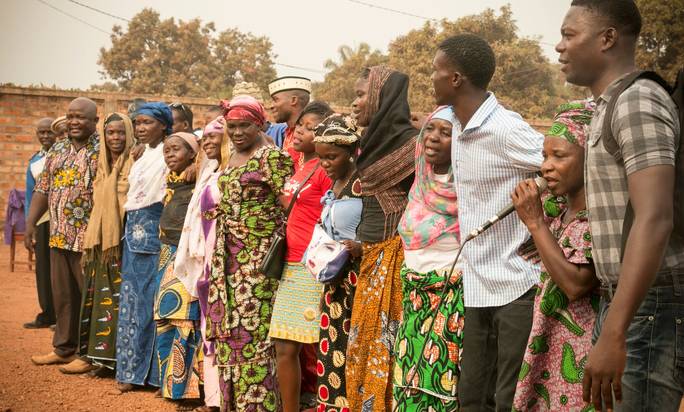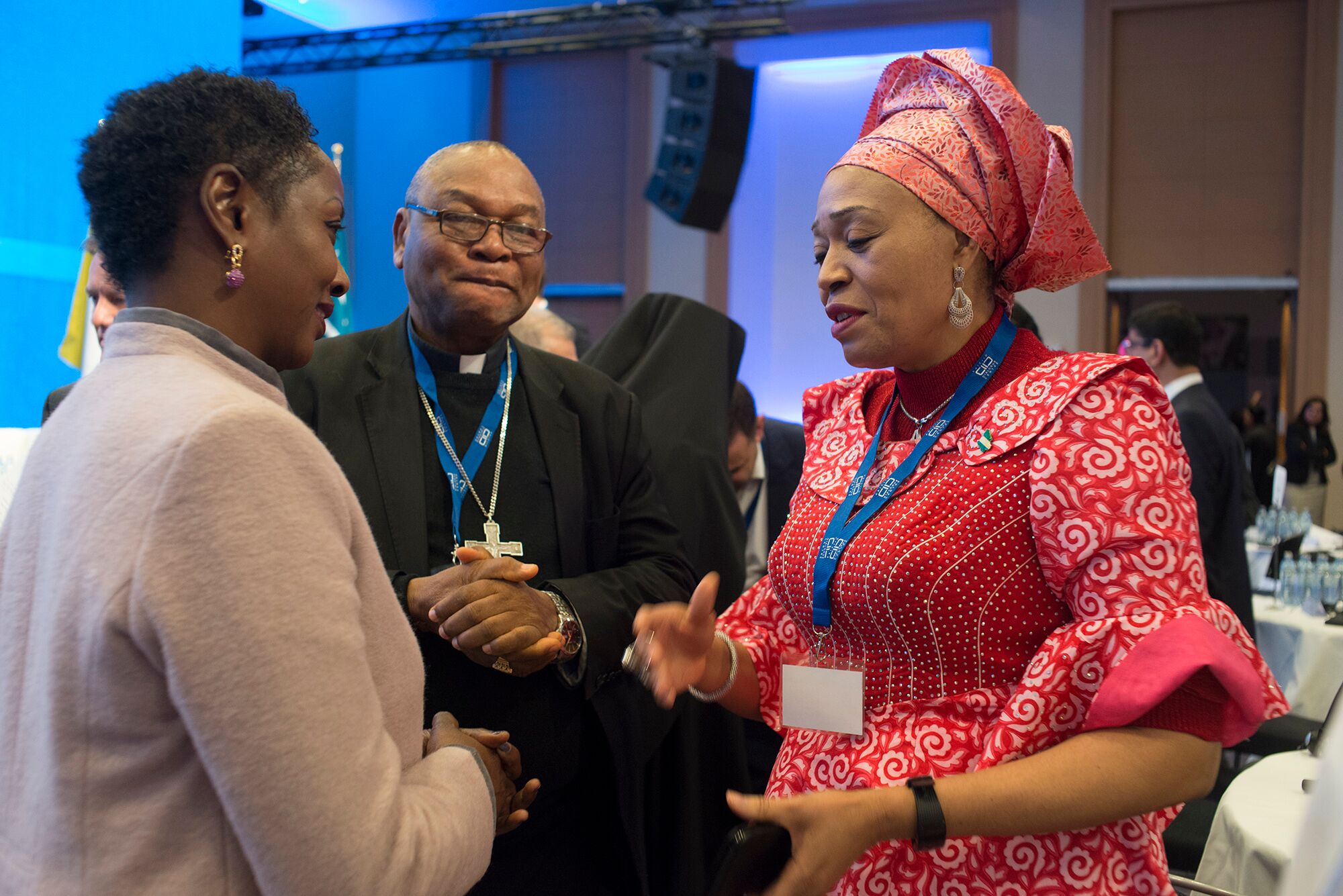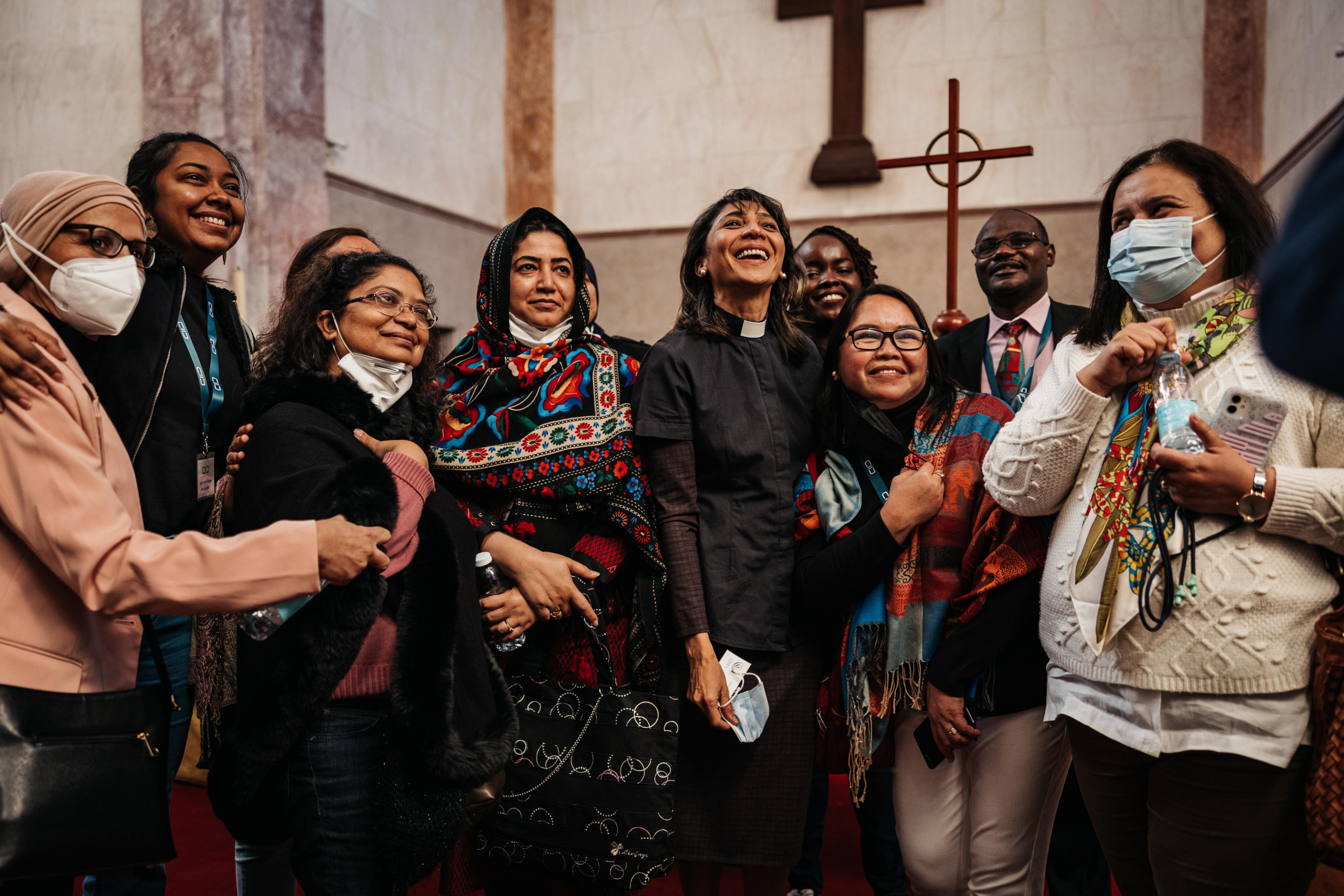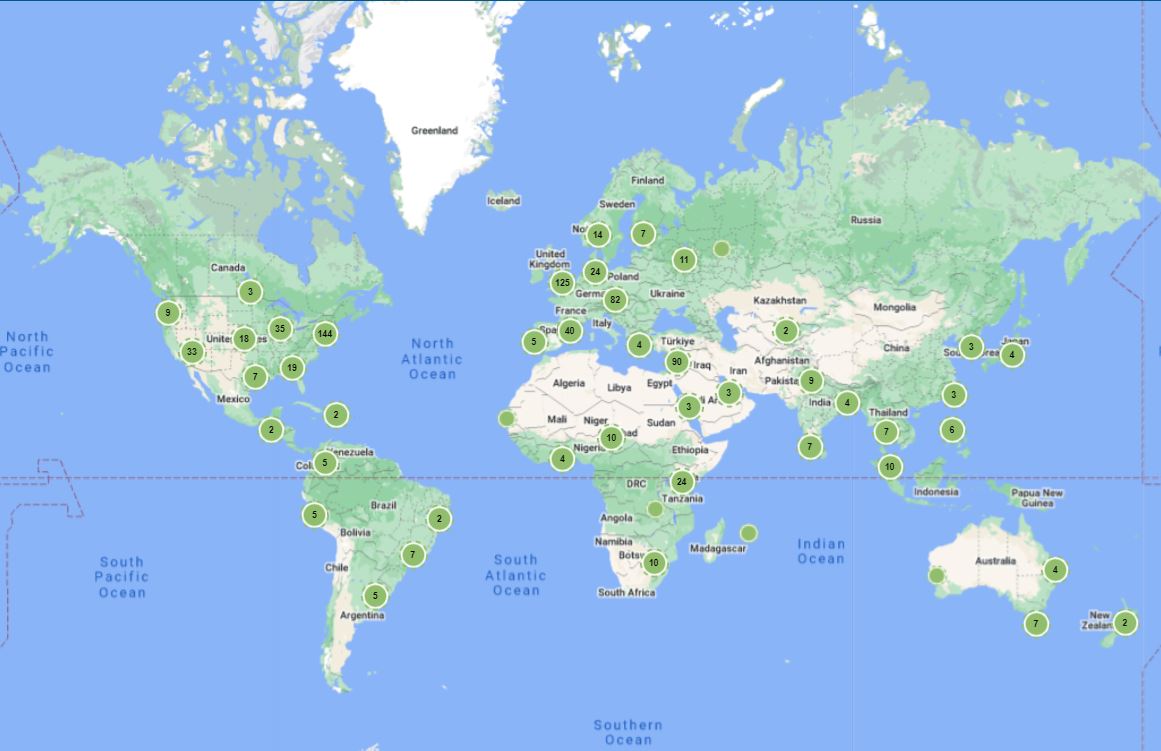Promising Practices
Promising Practices is a collation and expansion of existing documentation on promising practices in interreligious dialogue. Our database offers guidelines and focuses on the concrete implementation of interreligious and intercultural dialogue practices around the world.

Disclaimer:
Through providing different aspects and ideas our aim is to compliment the great work that has been already done in the field of Interreligious and Intercultural Dialogue. Information and field data published in this resource are for informational purposes only, and neither KAICIID nor the Dialogue Knowledge Hub guarantee in any way success of the implementation of the activity.
While we wish all the activities and initiatives featured in this resource could be replicable in as many context around the world as possible, there are often certain limitations, such as the suitability for particular cultures or religious communities. However, there is always room to explore and adjust activities in regards to the community’s environment.
- Mexico
- Morocco
- Advocacy
- Capacity Building & Empowerment
- Democracy
- Freedom of Expression
- Freedom of Religion and Belief
- Information Distribution
- Intercultural Dialogue
- Interreligious Dialogue
- Networking
- Peace
- Pluralism
- Shared Human Values
- Social Cohesion & Citizenship
- Women's Rights
- Islam
- Judaism
- Multireligious
Women Empowerment
Women are vital actors of society, and must be empowered to foster equality, dialogue, and peaceful coexistence. Women empowerment can take the shape of different practices and activities such as exhibitions or workshops. Exhibitions of women’s portraits can transcend religious differences, and empower women to share their narratives and experiences through pictures, thus focusing on the vital role they play in their communities. Exhibitions can be organized as a one-time event where it is initially organized, or can become a traveling exhibition, either within the initial country or from one country to another.
Moreover, in the religious sphere, women rarely have a leading role. The initiative “Women of Faith” gives women the opportunity to shine and lead in spaces where they are often marginalized. This initiative wishes to empower women to share their experiences and their perception on what their role is in modern religious communities.
- Guatemala
- Rwanda
- South Africa
- Sri Lanka
- Advocacy
- Capacity Building & Empowerment
- Confessional / Religious / Spiritual Activities
- Democracy
- Diplomacy
- Educational Programmes
- Freedom of Religion and Belief
- Human Security
- Humanitarian Aid
- Intercultural Dialogue
- Interreligious Dialogue
- Intrareligious Dialogue
- Networking
- Peace
- Pluralism
- Shared Human Values
- Social Cohesion & Citizenship
- Social Work & Community Service
- Youth
- Buddhism
- Islam
- Multireligious
Interfaith Conflict Mediation
Interfaith conflict mediation can take different forms, from democratic empowerment in post-conflict environments, to material exchanges and dialogue to reconcile. When a conflict arises between two protagonists that have cultural and religious differences, mediation has to be fair and objective; it should not favor one over the other. Intercultural Conflict mediation ensures that each perspective and belief are taken into account in the mediation process.
The Interfaith Democratic Empowerment is a program put in place by the religious leaders of a given country. They organize constitution reading workshops, debates, give their communities the judicial and advocacy tools to be active citizens in democracy building.
Interfaith material exchanges help establish a dialogue when it is hard for people to have verbal interactions with one another. Different religious communities can decide to work on a solidarity program with a specialized organization. These programs can take place through the year in villages or cities of religious communities or interfaith groups, to show that solidarity is a common value shared by all.
“Religions to Reconcile” uses religion as a means to reconcile and unite people. This initiative implements reconciliation in environments or countries where religious identities often oppose each other and engage in conflict, thus engages them to come together and build a better society.
- New Zealand
- Tanzania
- USA
- Advocacy
- Confessional / Religious / Spiritual Activities
- Democracy
- Educational Programmes
- Environment
- Human Security
- Humanitarian Aid
- Information Distribution
- Intercultural Dialogue
- Interreligious Dialogue
- Minority Rights
- Networking
- Peace
- Shared Human Values
- Social Cohesion & Citizenship
- Social Work & Community Service
- Youth
- Atheism
- Christianity
- Islam
- Multireligious
Meal Sharing
Food is an easy way to foster interfaith dialogue and peaceful coexistence, since it breaks down boundaries between communities and people.
Individuals open their homes to share dinner with 8-12 people from diverse religious backgrounds. During dinner, a trained facilitator leads the discussion and participants are invited to actively listen and share stories. A judgment free zone, these individuals are not expected to be experts in their religious tradition. Another similar practice involves people of different faiths getting together for dinner to welcome refugees in their country and community. Furthermore, people of different backgrounds can also be encouraged to share their dinner with people in need of shelter. Backed by their respective religious teachings, the interfaith group gathers to give assistance to the deprived, which is a value shared by many religions.
Sharing food can also be implemented in a yearly tradition. The Interfaith Food Day is a day in the year to discover diversity within a school or a workplace through food and traditional dishes. This initiative can be carried out for students to take pride in their development in a diverse and international environment while fully embracing their own identity.
- Lebanon
- New Zealand
- South Africa
- Turkey
- USA
- Capacity Building & Empowerment
- Confessional / Religious / Spiritual Activities
- Educational Programmes
- Freedom of Expression
- Freedom of Religion and Belief
- Interreligious Dialogue
- Intrareligious Dialogue
- Minority Rights
- Peace
- Pluralism
- Youth
- Christianity
- Islam
- Judaism
- Multireligious
Interreligious Course
Interreligious courses are an effective method to foster interfaith dialogue, as they educate. Different projects and pathways can be used to establish curricula and courses on interfaith coexistence, such as a national interfaith civic education. This can be formulated and organized by an interfaith organization that works closely with the education ministry of a given country to implement it. Through this unified national education curriculum, the youth are taught about understanding and accepting others’ beliefs, and that their citizenship entails a respect for all people regardless of their faith. Another project involves offering a year-long University course on interreligious issues, after which participants are awarded a diploma of interreligious affairs. The goal behind such a course is to inform students about our multi-religious world. This can be implemented in primary schools as well, through basic instructions on different belief systems and practices of their respective countries’ religions. Outside the school context, an educational activity can be conducted in parishes to bring together children of different traditions, such as Jewish and Christian faiths, on weekends to learn about the teachings of both religions. Other programmes and projects can offer a set of classes to learn about the history, development and contemporary practices of the world’s major religions. Such a program is designed for individuals seeking additional and informal education, and willing to participate in evening classes scheduled after work or university.
- Global
- Guatemala
- Lebanon
- Malaysia
- USA
- Capacity Building & Empowerment
- Confessional / Religious / Spiritual Activities
- Diplomacy
- Educational Programmes
- Freedom of Religion and Belief
- Human Security
- Humanitarian Aid
- Intercultural Dialogue
- Peace
- Shared Human Values
- Social Work & Community Service
- Women's Rights
- Youth
- Christianity
- Hinduism
- Islam
- Judaism
- Multireligious
Interfaith Volunteering
This promising practice happens in multi-religious societies throughout the whole year, and is based on a citywide network of diverse faith communities, which provides resources and temporary housing for families experiencing homelessness. Different religious communities come together to lead cooperative societal projects. They partner up with local authorities to create links between religious communities, through social work. Young people from different religions are encouraged to give their time to a communal service, or get together to cook and distribute food to homeless people, either on the streets or in community centres. Associations are actively working for the development of communities in need, seeking young volunteers from different religious backgrounds who would assist remote and isolated communities. Their goal is to challenge the traditional way of community building and development, by incorporating a social purpose into the practice. Community development has equally important economic and social effects, thus this practice assists precarious villages or neighborhoods throughout the year, and gives them a sense of community that they don’t often have because of their isolation, for
- Peru
- Sri Lanka
- USA
- Advocacy
- Capacity Building & Empowerment
- Confessional / Religious / Spiritual Activities
- Democracy
- Diplomacy
- Educational Programmes
- Freedom of Expression
- Freedom of Religion and Belief
- Information Distribution
- Intercultural Dialogue
- Interreligious Dialogue
- Networking
- Peace
- Pluralism
- Shared Human Values
- Social Cohesion & Citizenship
- Women's Rights
- Youth
- Christianity
- Indigenous Traditions
- Islam
- Multireligious
Interfaith Travel
Interfaith learning through international and interfaith travel to different countries, as well as weekend immersion trips to local houses of worship help build trust and relationships. In every conflict or area of tension, there are different sides to the story. The dual narrative tourism initiative is meant to provide visitors with two successive different narratives from two different guides, each one narrating their own perspective, for them to build their own opinion and expand their understanding of the situation. This practice can also take the form of visits to different religious spaces. Opening one’s religious space to others is a way of showing a facet of one’s religious identity and break down misconceptions. Inviting people to visit a place of worship is an opportunity to increase awareness and educate participants about a particular religion, answer questions and reinforce one’s faith through.
Interfaith travel can involve visiting different regions or countries. Interfaith region consists of touring one given region to shed light on similarities in terms of religious integration. Hence, this practice uses travel and tourism to focus on the question of identity and culture regardless of faith, and fosters interfaith unity through initiating discussions on interreligious similarities and differences.
Moreover, in countries where there are still indigenous communities, city-dwellers and these communities are not well-linked, as they live far away from the cities and are rather isolated. Interfaith travel can enable people from the city to reconnect with their backgrounds and the way their ancestors use to live, in order to recreate a link between all communities and to promote and support the indigenous way of life.
- Lebanon
- Poland
- Sri Lanka
- USA
- Capacity Building & Empowerment
- Confessional / Religious / Spiritual Activities
- Educational Programmes
- Freedom of Expression
- Freedom of Movement
- Freedom of Religion and Belief
- Intercultural Dialogue
- Interreligious Dialogue
- Intrareligious Dialogue
- Peace
- Youth
- Christianity
- Hinduism
- Islam
- Multireligious
Interfaith Theatre
The practice of interfaith theatre can be utilized in different ways to suit the context of the subject matter in question. For example, one practice called Bibliodrama invites participants to understand and discuss the main religious figures present in the holy texts of a religion other than their own. Another form of interfaith theatre brings together youths of different faiths to act together in a play based in a zone of conflict between groups of different religions. Another example is “The Hindu and the Cowboy”, which is a theatrical production created from the stories shared by the residents of Kansas City. It showcases how interfaith communities in a city do not need to be viewed as a ‘melting pot’, but rather as a mosaic, in which each faith has its own integrity and identity and contributes in their own way to the beautiful full image. Lastly, the “Theatre of the People” is a mobile theatre where people from different ethnic and religious backgrounds create and perform a play, and travel together for representations. Along with all the preparations and performances, the theatre troupe engages the masses through workshops in schools and public spaces, and promotes inclusion and reconciliation through art and theatre.
- Cyprus
- France
- Advocacy
- Capacity Building & Empowerment
- Democracy
- Educational Programmes
- Freedom of Movement
- Freedom of Religion and Belief
- Intercultural Dialogue
- Interreligious Dialogue
- Networking
- Peace
- Pluralism
- Shared Human Values
- Social Cohesion & Citizenship
- Social Work & Community Service
- Sports
- Youth
- Christianity
- Islam
- Multireligious
Interfaith Sporting Events
Youth from different religious and social backgrounds can play a sport together, for example football, in mixed teams to showcase interreligious coexistence. This event normally takes place in the environment linked to this sport (ex: on a football field), with a greater impact when it is implemented in neighborhoods of a city where there are interreligious tensions. It is advised to organize such sport encounters on a regular basis (more than only once as a symbolic event), so as to animate the neighborhood and establish long-term bonds.
Moreover, youth of different cultural and religious backgrounds can gather to hike along and across conflictual borders for peace and as a symbol of unity. Through this initiative, the participants can prove that living and walking through the same path regardless of their differences is possible.
- UK
- Advocacy
- Confessional / Religious / Spiritual Activities
- Freedom of Religion and Belief
- Intercultural Dialogue
- Intrareligious Dialogue
- Networking
- Peace
- Pluralism
- Religious Activities
- Islam
Attend Each Other’s Religious Celebrations
Attending or participating in celebrations and ceremonies of different religious communities generates a better understanding of each other’s religions and creates an opportunity to connect across religious traditions. The practice can take place in worship places, in people’s houses during celebration times of the respective traditions or even in neutral rooms, depending on the needs, and may be conducted by individuals and groups alike. It is also possible to come together for meditation or common prayers without the context of a particular religious holiday. Designed as an interreligious experience, the practice encourages deeper understanding of participating religious communities as well as the place of the dialogue participants within each of them, as such visits further consolidate the dialogue by seeing a religious person ‘in action’ within the context of their respective religious communities.
- India
- Tanzania
- Advocacy
- Capacity Building & Empowerment
- Democracy
- Intercultural Dialogue
- Interreligious Dialogue
- Intrareligious Dialogue
- Networking
- Peace
- Shared Human Values
- Social Cohesion & Citizenship
- Social Work & Community Service
- Christianity
- Islam
- Multireligious
- Sikh
Interfaith Fund Raising Activities
A religious or interreligious group gets together to raise funds for any interreligious project. It begins with selecting which project(s) will be allocated money and how much. The process of jointly agreeing on which project(s) is/are to be funded and how crosses boundaries between those participating religious communities. It also allows to focus on activities that all parties involved consider worth supporting. Meeting rooms of religious communities or NGOs or individual homes can serve as a meeting place. By taking professional decisions connected to finance, participants practice interfaith engagement, collaboration and agreement and gain more trust in each other. This, in turn, can trigger a chain of solidarity between different faith communities.




